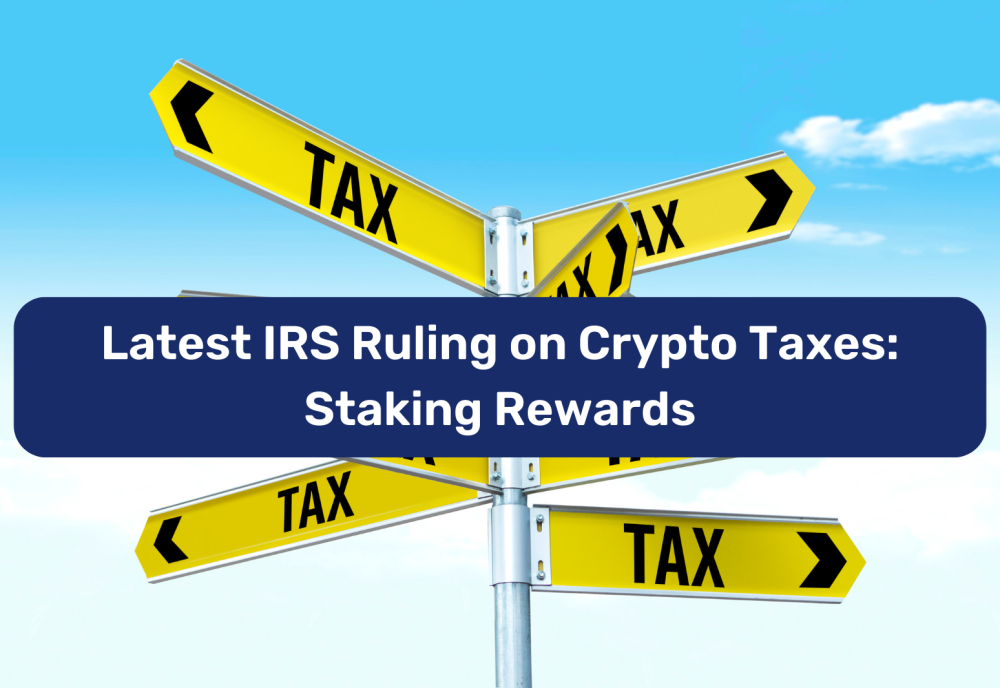Understanding the Latest IRS Ruling on Crypto Taxes: Staking Rewards
Learn what the IRS ruling on staking rewards means for your business and how it affects taxes

Published on:

Understanding the Latest IRS Ruling on Crypto Taxes: Staking Rewards
Learn what the IRS ruling on staking rewards means for your business and how it affects users taxes
As cryptocurrency continues to evolve, so do the tax rules surrounding it. The IRS recently issued essential guidance in Rev. Rul. 2023-14 that sheds light on the taxation of rewards received through staking cryptocurrency on proof-of-stake blockchains.
For those involved in staking, understanding the implications of this ruling is crucial to ensure compliance. In the post below, Amy Hatch, Tax Manager at TaxBit, has summarized the details of the IRS ruling, breaking down its impact on enterprises, platforms and individual taxpayers.
What is Staking and Proof-of-Stake Blockchain?
Before we delve into the IRS guidance, let's briefly review the basics. Staking is a process where cryptocurrency holders participate in the validation of transactions and the creation of new blocks on a blockchain. In proof-of-stake blockchains, individuals can become validators by "staking" or locking up a certain amount of cryptocurrency as collateral.
In return for their efforts, validators are rewarded with newly-created units of the native cryptocurrency often described as “rewards”. This process incentivizes users to secure the network and maintain its integrity.
IRS Guidance: Including Staking Rewards in Gross Income
According to Rev. Rul. 2023-14, if you are a taxpayer using the cash method of accounting and stake cryptocurrency, any rewards received through validation must be included in your gross income. You should recognize the fair market value of these rewards in the taxable year when you gain control over them.
For instance, if you stake 200 units of a cryptocurrency and receive two additional units as validation rewards, the fair market value of those two units should be included in your gross income when you can freely sell, exchange, or otherwise dispose of them.
The IRS ruling applies to both direct staking and staking through a cryptocurrency exchange. Whether you stake independently or through an exchange, the same rules for reporting rewards in your gross income apply.
The IRS ruling arrives as a significant development after the Ethereum Merge in September 2022 and the subsequent Shanghai Upgrade in April 2023. The Merge transitioned the Ethereum network to a proof-of-stake system. However, any rewards earned from Ethereum staking could not be withdrawn by validators until after the Shanghai upgrade - only then did validators have full dominion and control over their rewards. This revenue ruling offers clarity to many taxpayers concerned about when to report post-merge staking rewards.
Impact on Companies Offering Staking
Providing transparent and compliant staking services will become a competitive advantage as platforms that prioritize accurate reporting and tax compliance are more likely to attract and retain users who seek trustworthy and reliable services.
How to adapt reporting and compliance mechanisms to align with the new IRS guidance:
Enhanced Reporting Requirements: Companies offering crypto staking services will need to enhance their reporting capabilities to track and calculate the fair market value of staking rewards accurately based on the date users have full control over their staking rewards. This data is crucial for users to fulfill their tax obligations promptly and for the platform to maintain compliance.
User Support and Education: With the tax treatment of staking rewards clarified by the IRS, it is important to provide robust user support and education. Clear communication about the tax implications of staking rewards will help users understand their obligations and make informed financial decisions.
Partnering with Tax Experts: To navigate the complexities of crypto taxation effectively, companies offering crypto staking can partner with tax experts or tax compliance services such as TaxBit. Collaborating with professionals well-versed in crypto tax regulations can help ensure on-going compliance.
How TaxBit can Help
TaxBit is paving the way for businesses to streamline and automate their tax compliance processes while at the same time reducing operational risks and manual error-prone processes that weigh down too many organizations.
Our API-powered platform enables a single system of record to unlock scalable tax compliance that meets your business needs and complies with an ever-changing regulatory landscape. Reduce the burden on your internal teams and customers with a best-in-class compliance experience.
Learn more about what TaxBit can do for your business today.

